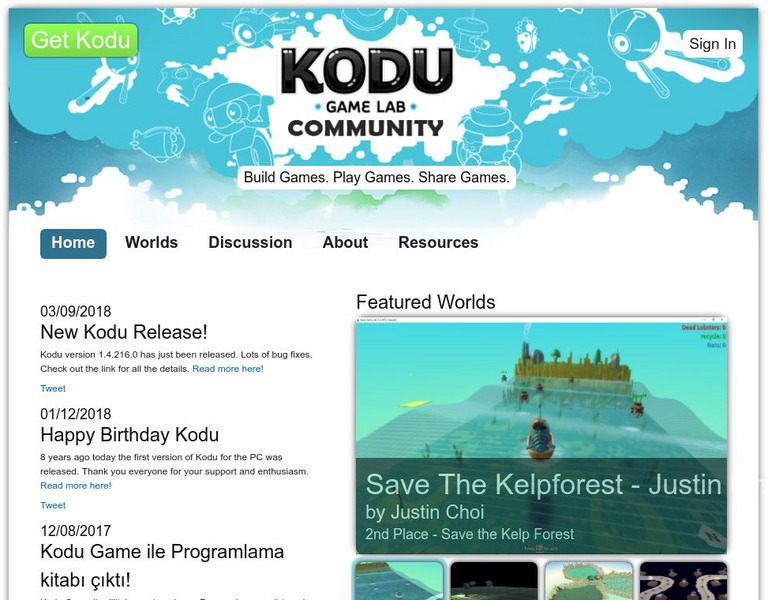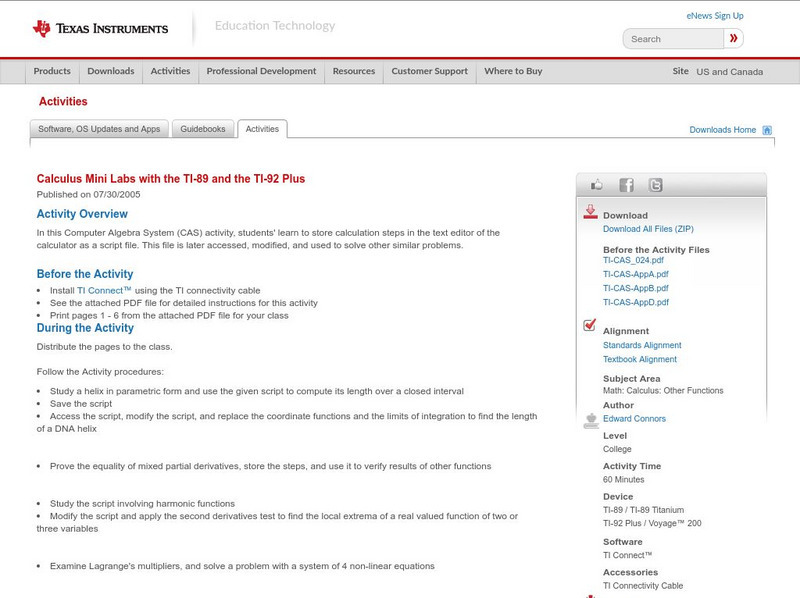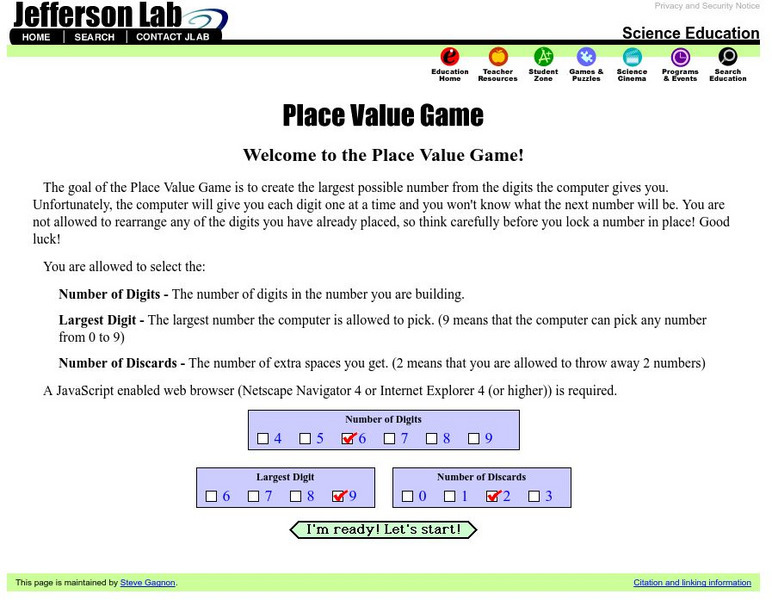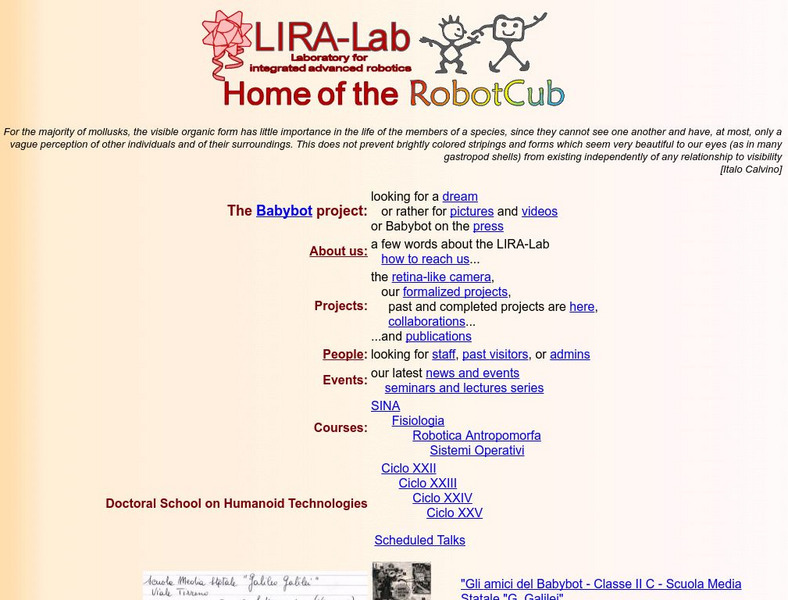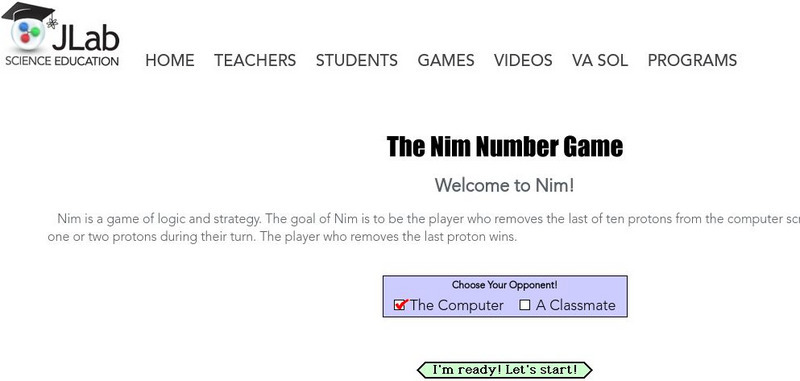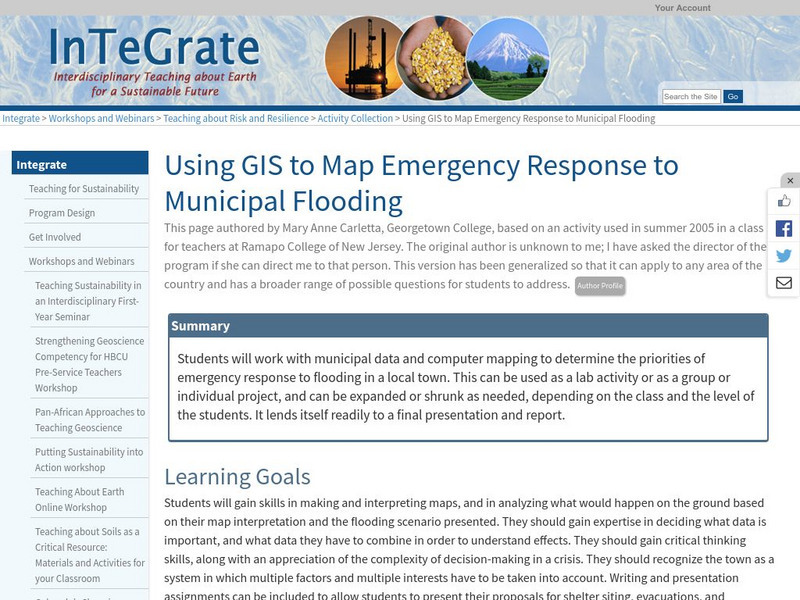Other
Microsoft Research: Fuse Labs: Kodu Game Lab
Using an artistic visual language, Kodu helps students create a world and an actual video game within that world. Learn basic coding and programming principles. Download the game lab or teacher lesson plans for free.
Other
Graphics Visualization & Usability Center: Animation Lab
A university-level article describing complex computer animation techniques used to simulate human motion. Includes helpful images.
Texas Instruments
Texas Instruments: Calculus Mini Labs With the Ti 89 and the Ti 92 Plus
In this Computer Algebra System (CAS) activity, students learn to store calculation steps in the text editor of the calculator as a script file. This file is later accessed, modified, and used to solve other similar problems.
Thomas Jefferson National Accelerator Facility
Jefferson Lab: Place Value Game
This interactive math game lets you create the largest number possible as the computer gives you numbers.
Other
Lira Lab: Laboratory for Integrated Advanced Robotics
Site of the LIRA-Lab in University of Genoa, Italy which specializes in artificial vision and sensory-motor coordination from a computational neuroscience perspective.
TeachEngineering
Teach Engineering: Peripheral Vision Lab
Students explore their peripheral vision by reading large letters on index cards. Then they repeat the experiment while looking through camera lenses, first a lens with a smaller focal length and then a lens with a larger focal length....
Smithsonian Institution
Lemelson Center: Spark!lab: Invent a Board Game [Pdf]
Are you interested in games? Have you innovative ideas? Use your imagination to create a story-based board game with inspiration from two early computer game designers.
Thomas Jefferson National Accelerator Facility
Jefferson Lab: Mystery Math
Amaze your friends with this number trick! Mystery Math is a number game that allows you to guess another person's secret number. If you want to play Mystery Math with the computer, you will need a pencil, a piece of paper and a...
Thomas Jefferson National Accelerator Facility
Jefferson Lab: The Nim Number Game
Students can play a game against the computer to see who gets the most protons.
Other
Sprk: Macro Lab Lesson 2 [Pdf]
Students will use the Sphero robotic ball to draw polygons and learn the relationship between heading angles and the number of sides in a polygon where all sides are equal. They will also learn how to setthe colors of the lights inside...
Other
Sprk: Macro Lab Lesson 3 Mean, Median, & Mode: Teacher Guide [Pdf]
Students will use Sphero to conduct an experiment. They will identify how long they need Sphero to move at 10% speed to reach and knock over a target object (such as a whiteboard marker). Using this information, they will then calculate...
Other
Sprk: Macro Lab Lesson 4 Percentages: Teacher Guide [Pdf]
Students will use Sphero to explore percentages using speed and color. The speed experiments are quantitative and the color experiments are qualitative. They will program the Sphero to move at 100% speed for a particular amount of time,...
Concord Consortium
Concord Consortium: Stem Resources: Confliction Selection Pressures
Investigate how selection pressures and natural selection influence populations growth with this computer model. Understand how a population changes when selection pressures are in conflict. Perform the virtual lab to see what happens to...
Other
National Cyber Forensics & Training Alliance
This site contains information about advanced training, security awareness in an effort to reduce cyber vulnerability, forensic and predictive analysis and lab analysis.
Concord Consortium
Concord Consortium: Stem Resources: Meiosis
Why don't you look exactly like your brother or sister? Meiosis involves the reducing of genetic material and chromosome shuffling which results in different genetic combinations. In this activity, students will view a computer model of...
Science Education Resource Center at Carleton College
Serc: Using Gis to Map Emergency Response to Municipal Flooding
In this lesson students will work with municipal data and computer mapping to determine the priorities of emergency response to flooding in a local town. This can be used as a lab activity or as a group or individual project, and can be...
Concord Consortium
Concord Consortium: Stem Resources: How Loud, How High?
What are ways to describe sound? Using the program downloaded called Sound Grapher and the microphone on the computer, students can investigate the frequency, wavelength, amplitude, and velocity of sound waves. Activity includes detailed...
Science Education Resource Center at Carleton College
Serc: Rainfall and Elevation: A Charting and Critical Thinking Exercise
In this lab, students will learn to organize and present data in a visual way so that they can then summarize in writing their conclusions about the relationships between the data.
Code.org
Code Studio: Picturing Data
Use a Play Lab project to collect data and make predictions. Use this unplugged activity to introduce data.
Massachusetts Institute of Technology
Mit: Open Course Ware: Courses: Electrical Engineering: Circuits and Electronics
College-level electrical engineering course highlighting circuits and electronics. This course introduces the fundamentals of the lumped circuit abstraction. Course features include video lectures, suggested readings, labs, lecture...
Discovery Education
Discovery Education: 3 M Young Scientist Challenge
Have you ever imagined going on an actual archaeological dig, climbing aboard a NASA spacecraft, or collecting insects in remote rain forests? This NASA site is your chance to join Discovery School winners on their exciting science...
TeachEngineering
Teach Engineering: Graphing the Spread of Disease
Students simulate disease transmission by collecting data based on their proximity to other students. One option for measuring proximity is by having Bluetooth devices "discover" each other. After data is collected, students apply graph...
Other
Delaware Center for Educational Technology
Learn about the agency and its services and conferences. The "Instructional" link provides a "Computer Skills Growth Chart," information on its Traveling Lab, teachers' academy, and other classroom resources.
University of Colorado
University of Colorado: Ph Et Interactive Simulations: Acid Base Solutions
How do strong and weak acids differ? Use lab tools on your computer to find out! Dip the paper or the probe into solution to measure the pH, or put in the electrodes to measure the conductivity. Then see how concentration and strength...
